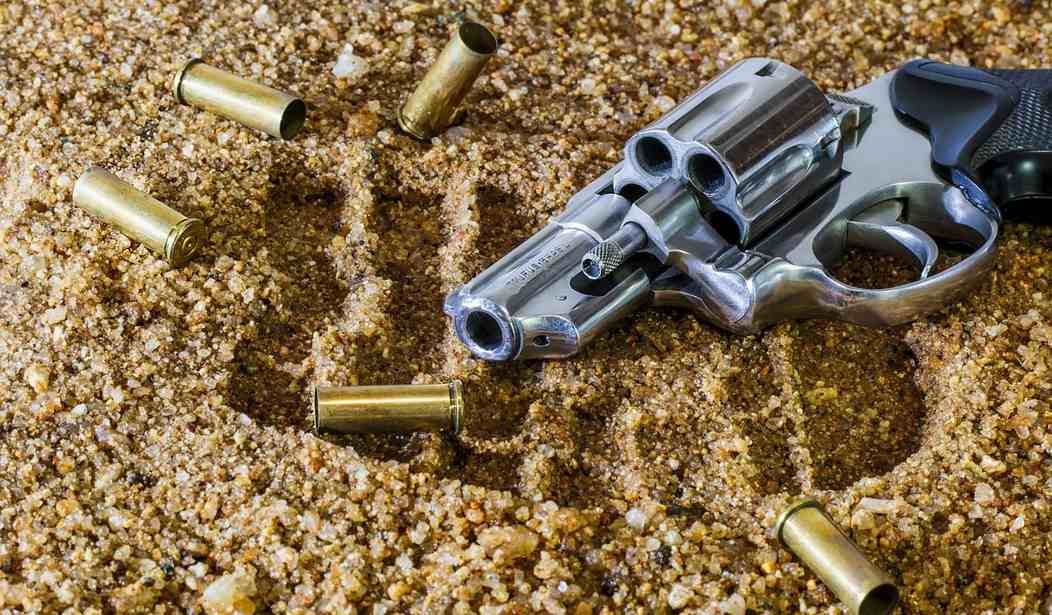A grand jury in Harris County, Texas has declined to charge a 17-year-old with murder after a convenience store clerk was shot and killed, apparently accepting the argument by the teen's attorney that his client was acting in self-defense.
According to authorities, Mario Young and an accomplice stole a bag of chips from the Sunoco station in Humble, Texas back in January. That crime was caught on the store's surveillance footage. 42-year-old Asif Maknojia, who was working at the story, then followed the teens and confronted them just outside the gas station. When the pair continued to walk away, Maknojia decided for some reason to get into his car and pursue the two teens. He caught with them a short distance away and once again confronted them as they were waiting to cross the street. That's when Young pulled a gun and fired at Majnojia, who was found dead in his car when police arrived on the scene.
So what led the grand jury to reject the murder charge that was presented by Harris County prosecutors?
Lott Brooks, Young's attorney, says he believed Young's story that the shooting was in self-defense.
He decided to put the teen in front of a grand jury to get the case thrown out.
"I wanted him to be there with the grand jury, be honest and tell them exactly what happened," he said.
He says that Maknokjia had a gun the day the shooting happened, and he showed the guns to the teens threateningly. Court documents do not specify if Maknojia had a gun or not.
"When they left there was no danger anymore, when he came around the corner and confronted them again, I think they were afraid for their lives," he said.
While Texas statutes do allow for the use of deadly force to protect property in some circumstances, pulling a gun to stop the teens from absconding with their stolen chips isn't one of them. The law states that individuals can use deadly force:
when and to the degree he reasonably believes the deadly force is immediately necessary:
(A) to prevent the other's imminent commission of arson, burglary, robbery, aggravated robbery, theft during the nighttime, or criminal mischief during the nighttime; or
(B) to prevent the other who is fleeing immediately after committing burglary, robbery, aggravated robbery, or theft during the nighttime from escaping with the property;
Oddly, if the shoplifting had taken place after sundown, Maknojia might have legally been allowed to display or even use his gun to prevent the teens from getting away, but the theft happened during daylight hours. Even then, it would have been far better if Maknojia had simply called police to report the theft instead of pursuing the teens himself.
Brooks argued that once the teens had left the area, there was no further threat to Maknojia or the property under his care. When the clerk confronted the teens, he was now the aggressor, according to the defense attorney, and Young had the right to fire in self-defense to protect himself and his accomplice. Generally speaking, you don't have the right to self-defense while you're committing a crime, but in this case the alleged shoplifting had already taken place.
I confess that the grand jury's verdict doesn't sit right with me, but from a legal perspective, it may very well have been the right call. Young didn't pull a gun on Maknojia when he first confronted the teens outside the gas station, which would have clearly justified any deadly force on the part of the store clerk. Once the teens left the premises, however, the crime was over and done with, and no matter how righteously angry Maknojia might have been at the brazen theft, he had no legal right to pursue the teens and confront them at gunpoint. I still think it's odd that court documents don't specify whether the clerk actually did have a gun on him, but I haven't seen any indication that prosecutors contend the clerk was unarmed when he went after the alleged shoplifters either.
Though the grand jury declined to indict Young on a murder charge, prosecutors could still try to re-file the murder charge or go after him for illegally possessing a firearm. That charge is pretty minor, especially compared to murder, however, and Young would most likely receive probation or a short stint behind bars if he's convicted.
My heart goes out to Maknojia's family and friends. By all accounts he was a good man with a wife and kids who was just trying to do the right thing. The grand jury's decision feels like an injustice, but ultimately it was up to the Harris County prosecutors to convince at least nine of the twelve grand jurors that there was probable cause to charge Young with murder, and they failed to do so.









Join the conversation as a VIP Member